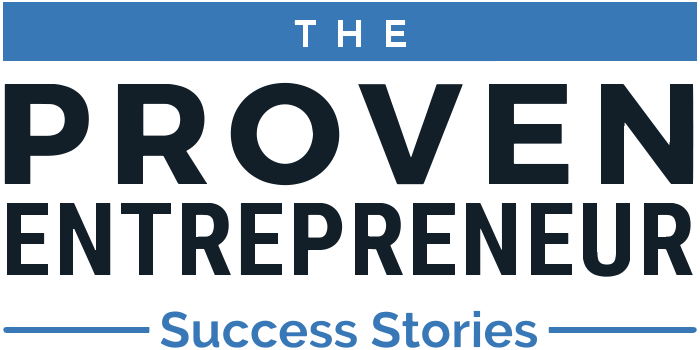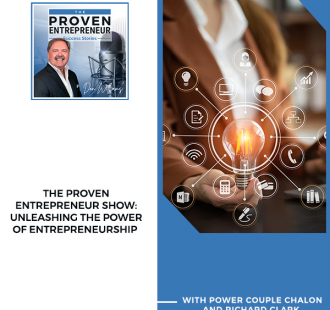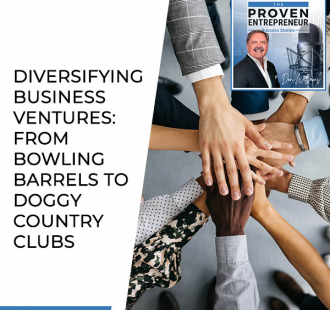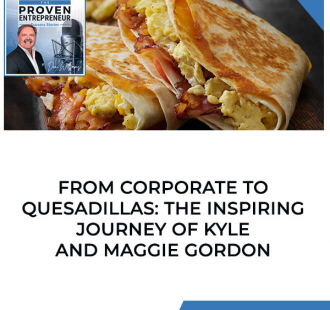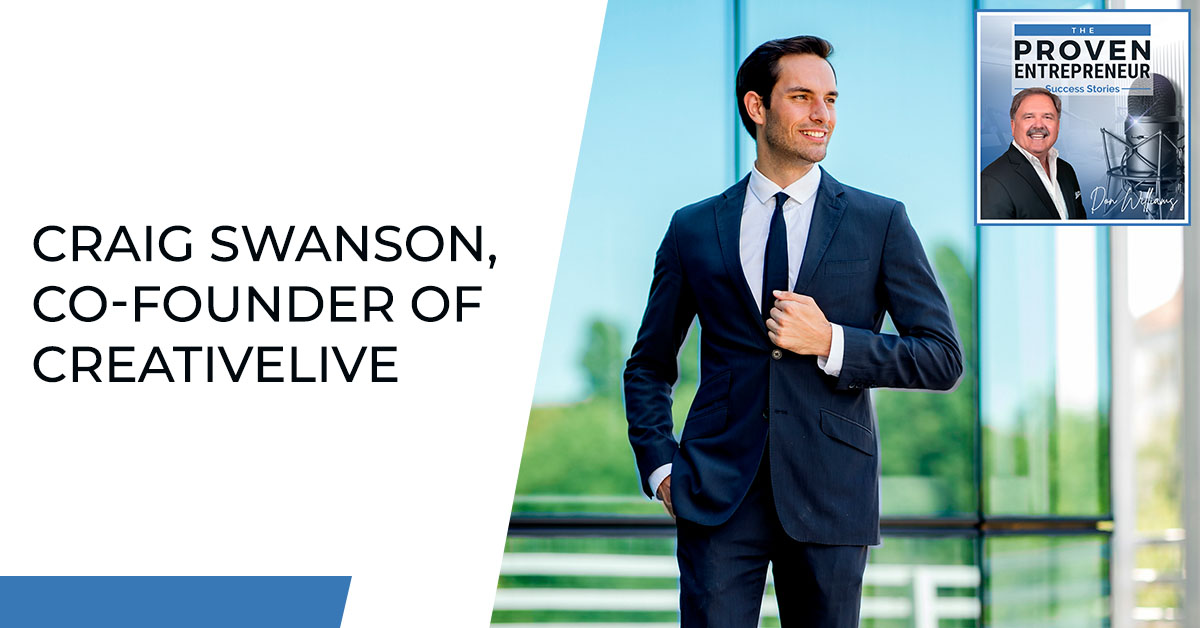
Winston Churchill said that success is walking from failure to failure with no loss of enthusiasm. Craig Swanson is an entrepreneur, business coach, and co-founder of CreativeLive who has lived this line. In this episode, Craig will share his story, including his journey with CreativeLive and how he became the secret weapon to its multimillion-dollar mark! Tune in as we discuss the factors of success, the path to creative breakthroughs, the potential of digitalization, the businessman’s perspective on failure, and more!
For information on how to work with Don visit Work With Don Williams
You can also reach out to Don Williams at https://donwilliamsglobal.com
Please join Don and his businesses in support of St. Jude’s Children Research Hospital in its Mission to cure Childhood Cancers. You can donate to St. Jude at stjude.org/donate
—
Watch the episode here
Craig Swanson, Co-Founder Of CreativeLive
Online Learning Platform Serving 10,000,000 Creators
My guest in this episode is a super entrepreneur hailing from Seattle, Washington, Craig Swanson. He is an entrepreneur, a business coach and a Cofounder of an online learning platform CreativeLive. He thrives being the secret weapon partnering with online businesses such as KaisaFit, Sue Bryce Education and The Wedding School, helping them grow to the multimillion-dollar mark and even acquisition. Craig, welcome to the show.
Thank you for having me. I have been looking forward to this.
I’m thrilled that you joined me. This will be evergreen but it’s a couple of days before Christmas 2022. I looked at this as an early Christmas gift that you were coming on the show so let’s unwrap it. Take a couple of minutes and tell me what is your profession. What are you doing business-wise?
I have had a couple of exits. At this point, I am an experienced entrepreneur. I’m probably on my 10th or 11th business at this point. I generally am running as a business partner with three businesses at a time. I work with creative content creators that have large audiences already like internet influencers but are looking for an operator partner or someone to help them take their talent and their genius to the next level.
I come in as a mix of a VC. I bring some money as an accelerator. I bring a little bit of team and then my business partner’s mindset to help them and us build something cool and big. That’s what I do and I love it. A lot of it is built on what I have been doing for the last couple of decades getting up to the point where I have got the skills to do this.
If we go back to your first paying job, maybe that job was a lemonade stand or maybe you were writing code, I don’t know, but the first time that you traded work or time for dollars. Tell us about that, would you?
I am almost positive that I traded time for dollars before this but my first would be a paper route when I was ten years old. I probably did something before that but I don’t think I was trading money for it. We were in Eastern Washington. You could do it a little bit younger. I had my first paper route when I was ten years old. I’m a father of kids and I look at them and go, “How are they going to learn to do things when all these jobs we had as kids like mowing the lawns, trading for cash and all this type of stuff don’t seem as easy as it used to be.”
I’m in the grandchild business but would I even allow my child to walk the streets at o-dark-30 in the morning placing or either throwing newspapers at the stoop or in some places, they required that they were hung on the door? Walking up to doors of strangers over and over and you are like, “Heck no. I wouldn’t let them do that.”
Yet, I’m glad I did. Thankfully, life has been pretty good, all safe but even kids don’t even trade cash because we are moving into this cashless society in a lot of ways. Learning to count cash and collect. Deal with people that are not paying. These skills as a ten-year-old, I was learning super helpful stuff.

You talk about a cashless society. I was in Silicon Valley. We are having an event that I’m facilitating and it’s at a bank but it’s a weird bank. It’s on the fifth floor of an office building. I can’t see any tellers. They give me a tour. We walk around. There’s a bunch of cubicles. We get to the end and in their break room, they have beer on tap. I’m like, “This is a weird bank.” They are like, “You think that’s weird? We are a cashless bank.”
That seems somewhat of an oxymoron to be a cashless bank and they are like, “We are a commercial bank so if you need cash, you are probably not our customer.” It’s pretty amazing. Those first jobs are entrepreneurship because you had to collect the money, deal with collections and do the whole thing. That’s how it was in Wichita, Kansas, where I was from. You were your little franchise.
When we moved to Seattle, I had to wait until I was twelve to pick up my paper route. I got a business license when I was thirteen to get a wholesale license for ice cream. I added an ice cream cart to the back of my bike that I was delivering papers on so I could sell ice cream at the same time I was delivering newspapers.
Sam Walton of Walmart Fame was in the electronics business before he was in the Walmart store business. Northwest Arkansas, Fayetteville and Bentonville are very close together. The other big industry there are chickens. Pilgrim’s Pride. The big chicken houses like if you are eating chicken tonight, it maybe came from Northwest Arkansas or Northeast Texas. That’s a chicken country.
As the semis would carry loads of chickens to New York City, Sam figured out something. He was a multitasker like you. He rented the empty truck for next to nothing, washed it out and brought back cheap electronics. It’s probably a black market from New York City to the central part of the country. That is the genesis of Walmart. As we know with so many entrepreneurs, a lot of them started with a little ingenuity and creativity and not very much cash. That’s not necessarily a bad way to go.
Find that little edge or niche that you can find and make something work.
Find that little edge, that little niche that you can find, and make something work. Click To TweetAs a child, was there an adult who was an entrepreneurial example in your life?
Not really, except that my parents kept getting into multi-level marketing. Things around organic soaps and different things like this. In a lot of ways, I look at it as if they were aspiring to find an entrepreneurial outlet that they never found. In some ways, I might be living the thing that they were searching for.
I have always thought that network marketers were looking for additional income and side hustle. That’s how many entrepreneurs start. It was something on the side but also, they have, at some level, this steep love for people. The whole, “I will get my friends and you’ll get your friends and they will get their friends and we’ll all be one big happy family.” A lot of those network marketing even used the nomenclature of family and that appeals to certain people.
Early on in my life, before I was not an entrepreneur until I was 26, I bought a couple of them and even made money at one. I see how geometric progression can work and a lot of entrepreneurs are putting that to use for them. Say your childhood, from 5 to 18 or whatever that was. Did you go to university, join the Marine Corps and the Merchant Marines or hike across Canada in the winter? What’d you do?
None of those things. I dropped out of high school and college consecutively. I was working at the high school newspaper in 1986 and 1987 when the first laser printers were coming out and ended up digitizing the high school newspaper. I got a job at a local weekly newspaper that was in my neighborhood that was trying to figure out how to digitize their company. When I say digitize, really old-fashioned digitized. We were printing it out on laser paper and put it together.
Extends instead of setting type or setting out to the electronic service bureau or different things like that. I ended up getting a 40-hour or a 30-hour week job being the production department for the local newspaper. I stopped going to high school except for a couple of classes. I’d even accepted the University of Washington. My paperwork didn’t say based on future grades so I didn’t care.
I went ahead and got a job. I spent about two quarters at the University of Washington and I was a Graphic Design major. I ended up getting a job in Downtown Seattle doing output for graphic designers that were doing their work on computers. I realized that this was on the cusp where no one knew more than me because nobody knew anything. The people I was going to take my resume to in four years as a designer needed my help. I borrowed first and last from my parents for an office space. Without any clue what we were doing, we started a business as an IT consultant for graphic designers.
Readers, I want you to learn this. “Without any clue as to what I was doing, I launched this business.” We know so many entrepreneurs that jumped out of the airplane and tried to build a parachute on the way down. Most of them figured it out because they had to. Some of them go splat.
One of the things I will say especially if you are lucky enough to start when you are young, I didn’t have very far to fall. I was falling from the high dive onto a trampoline. There was not a lot of risk in my life at that point. It’s not like at a mortgage. I didn’t have a kid. I didn’t have any of that yet. I happened to impress a couple of people. A couple of corporate clients took me under their wing because they needed what I knew and they liked helping people. They helped me and said, “I’m going to teach this kid what he needs to be to be a vendor of mine because he doesn’t know what he’s doing but I still need his help.”
He doesn’t know what he is doing but he knows more than I do about what he is doing. It took me a long time to figure out but I love that they had a little heart involved in their business where they’re like, “We are going to help this young guy.” It took me a long time to figure out my mission but my mission is helping others who help others. I love that. The magic for me did not start until I started playing for my heart and let my head play second. That was your first business then?
That was my first business. I went through a couple of iterations. I was eighteen when I started that. By the time I was nineteen, I formed an LLC that I ran until 2010 when I sold it to my employees. It was nowhere near the same business over those 25 years but it was the same legal entity that existed throughout.
I don’t think it was an LLC at the beginning. I didn’t know enough to have an LLC but it was the same business entity checking account and all that went through multiple iterations of whom I was five years as me trading my time. I then started trying to hire people and was terrible at it, letting them have any control and committing to them. I got people who wanted to work for a terrible boss and they weren’t very good either.
When you are terrible at it, that’s whom you get.
There was a point when I realized, “I’m not going to get good people until I’m ready to commit to good people. The people that I want are not going to play with me at my level.” I had to do a lot of self-work along the way. You use the phrase entrepreneur. I don’t think I applied the phrase entrepreneur to me until about 2010.
You’re not going to get good people until you’re ready to commit to good people. Click To TweetWhen I was between 30 and 40, I was aspiring to be an entrepreneur. I wanted to be in the Young Entrepreneur’s Club. I was a small business owner. I had been running the same small business for twenty years. It had gone through variations but an entrepreneur for me was someone that creates entities that can exist without them. I had never created an entity in which I was not a necessary cog. That’s what I aspired towards and that was the next chapter of my life around 2010 when I moved into the next phase of my life creating businesses that I wasn’t necessarily required in.
It’s an interesting fact. I have done 125 of these interviews and almost every guest makes some comment about, “I’m not sure I’m a proven entrepreneur. I worked for twenty years before I thought I was an entrepreneur.” There’s always a little question. Sometimes it’s full-blown self-doubt but sometimes it’s a question like, “Am I living up to the title?”
I have interviewed billionaire entrepreneurs that started with nothing, went bankrupt in a fabulous explosion of finances and then have built everything back and still have the same comment like, “I don’t know that I’m a proven entrepreneur.” When you spell it with a B, that’s the proof that you can get.
The name of this show is Proven Entrepreneur Success Stories but you and I both know that failing is not the opposite of success but steps towards success. I want to ask you about a hard lesson, something that happened at the time that you were like, “Soul crushing. It’s killing me. That hurts. Please stop,” but then maybe it turned out it was a pretty good thing to happen.
There are so many times. First of all, I’m a huge believer in failure. When I want something, the first step is to start failing in the direction of something I want because I don’t know any other way to learn. There was a time that I didn’t understand my vesting schedule and put about $2 million of stock vesting at risk because I was being a little bit impulsive in some decision-making. That was a terrifying moment.
There are a bunch of terrifying moments but the biggest one for me was I remember being in a fetal position on the floor of our living room with my wife. I felt so scared and trapped with that bouncing act between hiring my first employee and having my first employee go to my competitor almost within the first week. It’s this act of trying to open up, risk and have someone else bring them into the business and have them almost immediately turn around, leave the business and go become my competitor.
There have been deeper heartaches along the way. There have been bigger moments where I am terrified but that’s the one that felt most viscerally terrifying to me. It’s probably the one that I remember the emotions more. When something big comes up, I remind myself, “I felt this terror and feeling before.” Let it flow through. This isn’t the end. Don’t react at the moment because life is long.
When something really big comes up, remind yourself that you’ve felt this terror before and to just let it flow through. This isn't the end. Don't react in the moment because life is still long. Click To TweetWe’ll live to fight another day. One of my businesses is the call center business which is a lot of employees. When people tell me employee stories, I’m like, “I can tell you some stories.” Just because I have so many people and people are funny so they will do funny things. When you said that, what I recalled was the first time a client tried to hire my employees and do a vendor act for me, me being the vendor. That was pretty terrifying but we survived it.
One of my horror moments that turned into my proudest moments happened to me with my biggest client who took one of my most important employees. I had a non-compete in place that I worked out and we negotiated his exit in a way that he became my boss and my biggest client. It worked for him because in some ways, using the non-compete allowed him to negotiate the role he wanted instead of necessarily being put into a support role that he didn’t want.
That person eventually bought my company in 2010 when he left my biggest client. It’s one of those things where I have enforced non-competes. I have had all these things happen. The proudest moment was that I have people in my life that have experienced me as an employee, adversary, client and someone who bought my company. I’m able to use them as a recommendation that is when someone wants to know from someone who’s seen me on all sides, I have got two people that I can point them to that say, “These people have been through every ringer that exists in business with me. They can speak to me.”
Out of everybody I have interviewed for the show and then all the entrepreneurs I have met in 36 years, I have never heard that before. That’s pretty rare air because I’m a guy who talks to a lot of people. I love that. I think back to we had an account with General Electric, the general. We had two people assigned to them and they were so entrenched. They went to big trade shows.
It was the mortgage industry. If they were interested in a mortgage, it was big commercial stuff. This is why I love people with integrity. They wanted to hire the two staff mates but the VP calls and says, “We want to hire them.” I’m like, “No problem. There’s a clause in the contract that stipulates how you can do that.” They followed that and there was a buyout. It wasn’t seamless but it was fairly smooth. After about a year, they called back and said, “Swinging a miss. We’d like to know if you’d take them back and would you take the account back?”
Would you take the employees back and also have their service? Was that it?
Yes. I was like, “Sure, I think. It depends on what you did to their wage as to what my rate to you will be.” They had increased it. I was like, “Here’s the adder.” They were like, “Fine.” There are so many of those big companies anymore that are so reluctant to add permanent headcount. Outsourcing is huge because they don’t want to add anybody.
My takeaway from that is the thing that was drummed into me early on because I did about ten years of sales training in the early days in print sales. Business negotiation is not where I go to get my personal needs met. Many people are trying to prove that they are the most powerful or intelligent. They are trying to prove things about themselves instead of trying to find a win-win solution. I haven’t quite found the right words around but I like to play what I call a cutthroat win-win. I play win-win, even with people that want to play win-lose.

A long time ago, I learned in my life I want to be able to take either side of the deal. If I’d take either side, I’m probably good with the deal. If I’d only take one, I’m probably not. Life is too short. There’s a Chinese proverb and I’m going to butcher this so please forgive me but it’s something about you cannot eat all of the pie and that’s nowhere near. I’m sure it was Confucius. It’s something beautiful but that’s the gist.
Let’s go to a different moment. Let’s go to a warp-speed or hockey stick moment. You are going along in your business and things are going okay. All of a sudden, you take an action, prevent an action, add a teammate or a combination of that and whatever else. All of a sudden, it’s like, “Life was pretty good and it is phenomenal.” Do you have one of those you could share with us?
I do. I wanted to be part of the Young Entrepreneurs Club, which means that by 40 you have to be running a business over $1 million a year. This was the company I started when I was eighteen, an IT company. I wanted to get there. I got to $870,000 when I was 39. This was also right when the economic downturn hit in 2008 and all these things were happening.
I had spun up a training company in the back end of my business, a little virtual training company in part because I had got the company working without me. I was able to put my energy elsewhere. That company ended up being what we spun out and created an online training company called CreativeLive and CreativeLive went from 0 to $1.2 million in the 1st year in the year I was 40.
I hit my million in my next business after this and sold my main business to my employees. I have been on a rocket ship since then. That learning experience has been explosive. I learned about bringing in team members that were producers, organizers and executors. People didn’t have a vision of what to create but were extraordinary at the operation and the execution of building what can be created. That’s what I have been doing for the last decades in CreativeLive. We took about $50 million in investment from Silicon Valley and sold about $50 million in the same timeframe of online courses and digital goods.
Since then, I have been creating companies that sell digital goods and online courses. I did a tally. I’m at $92.5 million in digital goods and courses for my career. Creating something digital and working with large audiences, I learned to turn what I always thought was my weakness, which was the fact that I was not flighty but I was always thinking about creative ideas the next thing and was not necessarily the best person to execute. I spent about 25 years trying to be the executor of my business. When I realized that there were people designed to be the executor of my businesses and it freed me up to be the creator of my businesses, my life exploded.
Have you heard of Dave Rendall?
No. I love hearing a name I don’t know.
Dave is a public speaker out of North Carolina. He wrote a book called Pink Goldfish. Dave is this stand out in a crowd very tall and thin guy. He always wears hot Pepto-Bismol pink so pink pants, a pink shirt, a pink sport coat and pink glasses. He’s very intelligent. He shares that his whole school life he suffered from ADHD. Everybody who was ever around and told him to sit down, he’s like, “You know what I do? I don’t sit down and shut up.” His theory is this, “What makes you weird, makes you wonderful. You should be running towards your purported weaknesses because that is where your superpower is.” He’s a phenomenal guy. Dave, I hope to see you soon. I will introduce you to Craig next time we are all together.
Can I underscore that because I am a huge believer? The business I build is built around that idea. Let’s also take it a step further. When you are an adult and you are extraordinary at something and you are playing at the top of somebody’s game and you have this list of things that we call weaknesses, the things that we call weaknesses are the things that we were taught as kids we should not be.
When we are dealing with entrepreneurs and business people, they are pretty disciplined and good at building things they want. The stuff they can’t get rid of in themselves or cut out with a knife because it was their weakness that is so embedded into them, it’s their strength. It is the magic that takes them to the next level when they make peace with it, turn it around and use it.
What it was for me was this ability to come up with ideas. It may sound like a small thing. I’m one of those guys that aren’t an idea generator. I spent 25 years trying to tap that down because I thought it was going to lead to my divorce and bankruptcy. I thought it was going to lead to everything wrong. I was trying to live one idea that I had come up with a long time ago and turn off this thing. I got extraordinarily upset with one of my sales reps who had the audacity to start coming up with ideas.
For me, it is sometimes a cue when I have an emotional response that is way out of line with whatever circumstances are happening. That’s a cue for me to go digging in there and understand, “What am I responding to because it’s not this thing in the moment?” I realized that he was doing exactly what I was not allowing myself to do, which is to come up with ideas without having a plan.

I gave myself an idea generation where I separated it from execution and my business. Effectively, I created this path for me where I started to learn how to let that part of myself be, how to be proud of it and how to love it instead of trying to tamp it down, shut it off and get it to exist within this one thing that I had given it to do for the last couple of decades.
Words of wisdom there, people. Be proud of it and learn to love it. What about a nugget? Something you know that is so wise, smart and valuable or something you know that we don’t know that we want to know what you know.
On the spot, I’m having a hard time but it probably comes down to not renegotiating my relationship with reality. I work and coach a lot of entrepreneurs that put a tremendous amount of effort into predicting how something that they have been suggested or want to do is going to be responded to by a person or the market. Spend years not doing something instead of allowing the market to answer back and tell them what works or doesn’t work.
This comes back to the original question about failure. When I started my business after one of my exits, I set aside enough money to fail 5 times in my next 5 businesses. I put a budget for each one of those attempts and had a certain amount of money that I could put into it. For me, I need to fully embrace failure as an option so I don’t take any steps off the table and cut things off simply because I might fail at them. Many people would rather trade their dreams or never have to potentially be wrong about one of the steps in the process.

One of the first things I do is raise prices on everything and my client is breathing in a brown paper bag. “People won’t pay.” I’m like, “They will pay. Don’t worry about it.” They will share all these reasons why that won’t work and I’m like, “It’s like you are shadowboxing yourself.” Let’s go box the market. If they tell you I’m wrong, I will be the first to say, “I’m wrong,” but I will tell you, “I will bet I’m right and you are paying me a lot so you should listen to me.”
I have occasionally overpriced something and you know what you can do? You change your price.
Every day. I started in pretty hardcore sales, timeshare camping membership and things like that to where you are selling an intangible and you know when you go to work. I came to get my money out of your pocket and give you whatever. I probably still do it. If a red week is $35,000, they will sell out that for a couple of weeks and then a red week will be $40,000 for a couple of weeks. They will continue to ratchet the price up until they have a two-week timeframe where sales take a dip and then they will stay there two more weeks to be sure it’s not a fluke. They then will take one step back and that’s how they price it. They price based on the market.
One of my good friends here runs a lead service. People buy leads from him. He has an auction like Google where the market sets the price that’s almost always higher than any price you had set and it works the same way on labor. I have a client that I spoke with who said, “I’m going to offer this to this employee and I hope that will give them some incentive.” My counsel was like, “Why don’t you ask the employee what would be helpful to you? What would scratch this itch of motivation for you and doing good for the company?” He called me back that afternoon and said, “It was a lot less than what I was going to offer.” I was like, “That’s why we ask the question.” We quit trying to assume our way to solutions and let’s ask if you can rarely get in trouble for asking.
The thing is also if I trust myself to have the ability to say no if I don’t want to do something and if I trust myself to respond. A lot of people don’t ask questions because they are either afraid of looking like they don’t know the answer, afraid of looking stupid or afraid that somehow what comes back they are not going to be able to say no to and take a worse deal than they could otherwise. I’m a huge believer in asking, asking a lot of questions of both individuals on the market and understanding what the environment is, rather than me coming up with my story in my head and trying to impose its reality.
I’m a firm proponent of that. I typically live on the sales side. I’m the non-sales guy sales guy. I’m like, “Just ask questions and help people. They will throw their money at you. You won’t be able to count it all.” Quit trying to make people do something. Make it easy to do something and that will work. I’m going to put you in the time machine and we are going to dial you back to twenty-year-old Craig. You are going to get 30 or 60 seconds, 90 maybe to share 1 piece of wisdom with 20-year-old Craig that would have helped you and sped you along the way if you knew then. What’s something you know now you wish you knew then? Into the time machine, you go. What would you say?
The one thing I don’t want 20-year-old Craig is to screw what 50-year-old Craig has got. First of all, I’d say thank you for what you are doing and just know it’s going to be okay. If I could give him a little bit of ease of mind with what he is going to go through because everything he is running into is he is investing in me now and I’m so grateful for it.
How can we support you?
I appreciate the time to talk. I have enjoyed talking with you. This is most of my reward in the Seattle area. If there are any of your audience reading that has companies that are doing $250,000 a year that has not yet broken $1 million, I am the Chair of our local EO accelerator program. It’s an accelerator program that we are part of Entrepreneur’s Organization in Seattle. We are here to support entrepreneurs that are trying to figure out how to break that $1 million mark. You could find me on LinkedIn or go to SeattleAccelerator.org.
We give a plug for EO, which we are both big fans of. The Accelerator Program and EO are so wildly successful all around the globe in helping entrepreneurs go from that $250 to $999 sales range up to over $1 million. We cannot encourage you enough. If you are there, reach out and if you are in the Seattle area, reach out to Craig. If you are anywhere in the world, you could reach out to Craig or me. We would connect you with someone local to you because there is help out there and they’d love to help you. What’s your contact information?
CraigSwanson.org is probably the best place to find me for all my various links. It’s my name .org. I haven’t convinced the other Craig to give up the .com.
Craig, thank you so very much. I’m so grateful to you for coming to the show and sharing your wisdom. That’s it for this episode. See you next time.
Important Links
- CreativeLive
- KaisaFit
- Sue Bryce Education
- The Wedding School
- Pink Goldfish
- LinkedIn – Craig Swanson
- SeattleAccelerator.org
- CraigSwanson.org
About Craig Swanson
 Craig Swanson is an entrepreneur, business coach, and co-founder of the online learning platform CreativeLive. Craig thrives being the secret weapon partnering with online businesses such as KaisaFit, Sue Bryce Education, and The Wedding School by helping them into the multi-million-dollar mark and even acquisition!
Craig Swanson is an entrepreneur, business coach, and co-founder of the online learning platform CreativeLive. Craig thrives being the secret weapon partnering with online businesses such as KaisaFit, Sue Bryce Education, and The Wedding School by helping them into the multi-million-dollar mark and even acquisition!
At the age of 18, Craig founded Swanson Tech Support and worked as a tech consultant for 6 years before founding CreativeTechs which lead to over a million dollars in sales.
Soon after Craig co-founded the creative online learning platform CreativeLive, an idea that was birthed from a failed video training program for his IT business. CreativeLive would grow from a small start-up team to 70+ employees offering workshops with top industry leaders like Tim Ferriss and Brené Brown.
Now Craig partners with creators, educators, and influencers by providing the missing piece that they need to get to the next stage of their business and is helping build $1 million dollar businesses one step at a time. He is also the head of the Seattle Entrepreneur’s Organization Accelerator Program where he works on a similar mission, helping startups with $250k in revenue top the million-dollar mark.
For information on how to work with Don visit Work With Don Williams
You can also reach out to Don Williams at https://donwilliamsglobal.com
Please join Don and his businesses in support of St. Jude’s Children Research Hospital in its Mission to cure Childhood Cancers. You can donate to St. Jude at stjude.org/donate
